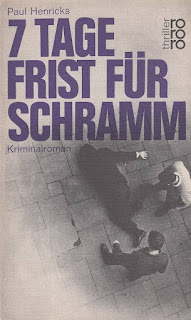A slap given by one of the teachers (Konrad Georg) in a boarding school for boys is the catalyst for an escalating series of mysterious disappearances and murders and far reaching revelations. Sieben Tage Frist is one of the few Krimis that is actually a bit more readily available. Under the title School of Fear a dubbed version can be found in some regions on Amazon Prime or Cultpix. Nevertheless, it is also one of the lesser known examples of the genre. Even on German TV it had only ever been shown once, yet a lot of people who have actually watched this often rate it as one of the best and favourite Krimis ever made.
The reason why the film may not automatically come to mind in discussions about the genre is that it’s not just not part of a series but indeed epitomises quite the opposite of classic Krimi as it’s generally known.
Shot in 1969 towards the end of the great Krimi era, this is a contemporary thriller based on the novel Sieben Tage Frist for Schramm [tr. “Seven Days Grace for Schramm”] by German author Paul Henricks.
In actual fact despite being directed by Alfred Vohrer and starring a couple of familiar Krimi faces, the film can easily be described as an anti-Wallace.
Set in a wintery landscape in the German Federal State of Schleswig-Holstein, the plot takes place in a boarding school for boys as opposed to all the various Rialto institutions for girls. Urban London is replaced by a barren coastal seaside that also features a solitary brothel with a somewhat blasphemous and political wall painting.
Students read underground magazines and use swear words. Bullying and animal cruelty is part of life for the school’s pupils.
Homosexuality was only fully decriminalised in Germany in 1994 but gay acts between adults above the age of 21 were already made legal in 1969, the year this film was shot, and a gay subtext clearly permeates this movie. We even get a glimpse of some brief full frontal male nudity.
And if that wasn’t enough at some stage we even get a Nazi war crime reveal.
For the most part Krimis were part of the German entertainment establishment of the 1960s and as such remained staunchly apolitical. Barring some mild references to the Third Reich in some of the earlier Mabuse films of the 1960s (small wonder given their pedigree), it is genuinely difficult to come up with other contemporary samples of the genre that contain elements of “Vergangenheitsbewältigung” (= coming to terms with the country’s past).
The student revolts of 1968 changed all that and left a big impact on German culture and society and this film is a reflection of this and an attempt to create a mélange of a traditional Krimi with a social awareness.
The link that ties those two spheres together is the employment of old school talent in front of and behind the camera.
Rather than use an up and coming director of the New German Cinema who had declared that “"Opas Kino ist tot” (Grandad’s cinema is dead), Luggi Waldleitner, the producer, wisely chose Alfred Vohrer to direct this production. Vohrer together with cinematographer Ernst W. Kalinke (another established Krimi-routinier) captured the bleak winter landscape remarkably well but also - typical for similar productions of the time - overdid the zooms.
This is Joachim Fuchsberger’s seventh and final collaboration with Vohrer and given the context of this production it is symptomatic that he no longer plays the dashing young hero but instead a teacher at the school, ie an older authority figure to the younger generation (albeit one that is most interested in solving the crimes).
Horst Tappert is the constantly (to the point of comical annoyance for the viewer) cigar-chomping-and-spitting investigating officer. Given that in real life Tappert a few years after his death was outed as having been a member of the SS, it is ironic that in this film he is one of the men responsible for revealing war crimes. One wonders what must have gone through his head when he shot this film. Did he ever ponder what would happen if his own involvement in Nazi atrocities became public knowledge?
The only one of the younger actors with anything resembling a film career was Frithjof Vierock who was mainly known as a comedy actor and at this stage had been in the business for close to a decade. For Arthur Richelman who plays Kurrat, the main pupil, however, this would remain his only feature film.
There is no debate: School of Fear is a highly unusual and more contemporary classic Krimi than anything else we have come to know from this genre. It is much more political, radical and socially conscious than the other series and for that reason alone it is worth a rediscovery.
And yet, I also can’t help but feel that it is this very contemporariness that also dates it more than its better known predecessors.
Nobody would accuse the Edgar Wallace Krimis to still be super current in 2024. They clearly have developed various sheets of patina but as they are set in an entirely fictitious universe that never really existed in the real world, they also contain a timelessness that School of Fear, a production clearly routed in 1969, lacks.
The German trailer has comments from the three leading actors that despite their lengthy résumés, none of them had ever been in a film that "hits the nerve" as much as this one.
The German PAL Region 2 DVD appears to also contain the English track and is available from Amazon UK, Amazon US and Amazon DE. It is, however, very pricey at this stage.





















.jpg)


